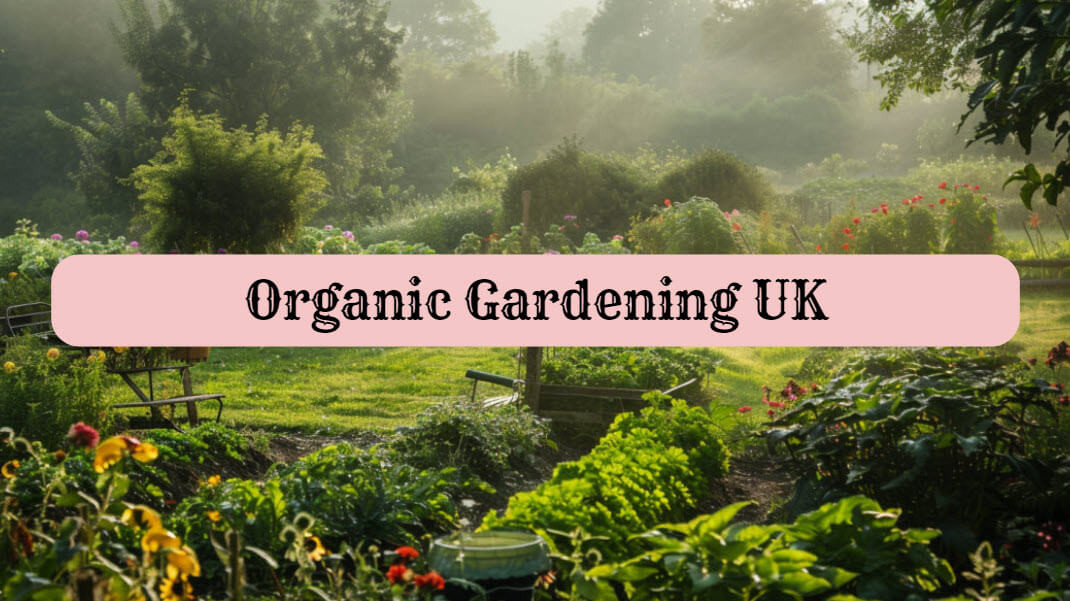If you would prefer to listen to this post, click on the audio below.
Introduction & Free Book
In the lush landscapes of the United Kingdom, there exists a timeless tradition intertwined with nature – gardening organically. It’s not just about cultivating plants; it’s about nurturing life in harmony with the environment. At its core, this type of growing is a philosophy that embraces sustainability, biodiversity, and respect for the natural world.
In this comprehensive guide, we delve deep into the principles, techniques, and rewards of mastering the art of gardening naturally in the UK.
Table of Contents
Understanding Organic Gardening
What Sets Organic Gardening Apart
This method stands apart from conventional methods by prioritizing natural approaches over synthetic chemicals. Instead of relying on pesticides and artificial fertilizers, organic gardeners harness the power of nature to cultivate healthy, vibrant gardens. By nurturing the soil, fostering beneficial insects, and practising crop rotation, organic gardeners create resilient ecosystems that thrive without harmful inputs.
Benefits of Organic Gardening
The benefits of organic gardening extend far beyond the garden gate. Not only does it produce wholesome, chemical-free produce, but it also promotes environmental stewardship and supports local ecosystems. By avoiding synthetic chemicals, organic gardeners safeguard water quality, protect pollinators, and mitigate climate change. Moreover, organic gardening fosters a deeper connection to the land, fostering a sense of mindfulness and well-being.
Getting Started
Choosing the Right Location
The first step in mastering organic gardening is selecting the ideal location for your garden. Choose a site that receives ample sunlight, has well-drained soil, and is sheltered from harsh winds. Consider factors such as proximity to water sources, accessibility, and potential exposure to pests. By carefully assessing your options, you can create a thriving garden that flourishes year-round.
Building Healthy Soil
Healthy soil is the foundation of any successful organic garden. Begin by testing your soil to determine its pH level and nutrient content. Amend the soil as needed with organic matter such as compost, aged manure, or leaf mould. Aim for a loamy texture that is rich in nutrients and teeming with beneficial microorganisms. By nurturing your soil, you lay the groundwork for a bountiful harvest and resilient plants.
Choosing the Right Plants
Selecting the right plants is crucial to the success of your organic garden. Choose varieties that are well-suited to your climate and soil conditions, and consider factors such as disease resistance and pest tolerance. Embrace diversity by incorporating a mix of vegetables, fruits, herbs, and flowers. Companion planting can help deter pests, attract beneficial insects, and improve pollination, creating a balanced and harmonious garden ecosystem.
Maintaining Your Garden
Watering Wisely
Proper watering is essential to the health and vitality of your organic garden. Water deeply and infrequently to encourage deep root growth and drought resistance. Consider installing drip irrigation or soaker hoses to deliver water directly to the roots while minimizing evaporation. Mulching can help retain moisture, suppress weeds, and regulate soil temperature, reducing the need for frequent watering.
Managing Pests and Diseases
In an organic garden, pest and disease management relies on prevention and natural remedies rather than chemical interventions. Encourage biodiversity by planting a diverse range of crops and flowers to attract beneficial insects and predators. Handpick pests, such as aphids and caterpillars, and use barriers such as row covers to protect vulnerable plants. Neem oil, garlic spray, and insecticidal soap can help control pests while minimizing harm to beneficial insects and pollinators.
Harvesting and Preservation
As your garden matures, the time will come to reap the fruits of your labour. Harvest vegetables and fruits when they are ripe, taking care to handle them gently to avoid bruising. Preserve your harvest through canning, freezing, drying, or fermenting to enjoy the bounty of your garden year-round. Share your surplus with friends, family, and neighbours, spreading the joy of homegrown goodness far and wide.

FREE BOOK
Click Here to download your free eBook on Organic Gardening
Key Takeaways
- Embrace Natural Methods: Organic gardening prioritizes natural approaches over synthetic chemicals, promoting a healthier environment and produce.
- Build Healthy Soil: Healthy soil is the foundation of a successful organic garden, enriched with organic matter to support plant growth and vitality.
- Promote Biodiversity: Encourage biodiversity in your garden by planting a variety of crops and flowers to attract beneficial insects and wildlife.
- Practice Sustainable Techniques: From water conservation to pest management, organic gardening emphasizes sustainable practices that minimize harm to the environment.
- Enjoy the Rewards: Organic gardening not only yields delicious and nutritious produce but also fosters a sense of satisfaction, well-being, and connection to nature.
Conclusion: Cultivating a Sustainable Future
In the tapestry of life, organic gardening is a thread that binds us to the earth and nourishes our bodies and souls. By mastering the art of organic gardening in the UK, we cultivate not only gardens but also communities, ecosystems, and a sustainable future for generations to come. Embrace the beauty of organic gardening and embark on a journey of discovery, connection, and abundance.
FAQs (Frequently Asked Questions)
What is organic gardening?
Organic gardening is a method of growing plants using natural techniques and materials, avoiding synthetic chemicals and pesticides.
Why should I choose organic gardening?
Organic gardening promotes environmental sustainability, produces healthier and tastier produce, and fosters a deeper connection to nature.
How do I start an organic garden?
To start an organic garden, choose a sunny location, improve soil health with organic matter, select suitable plants, and practice natural pest and disease management.
How can I manage pests without chemicals?
Pest management in organic gardening involves promoting biodiversity, using physical barriers, employing natural predators, and utilizing organic pest control products.
Is organic gardening more challenging than conventional gardening?
While organic gardening requires a different approach, it can be just as rewarding and offers numerous benefits for both the gardener and the environment.

If you need any further information or assistance with this article, don’t hesitate to Contact Us





















